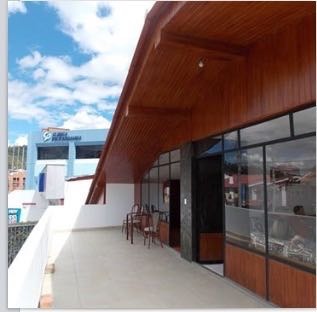Ecuador judge rules that natural gas flaring at oil production facilities in the Amazon must end
A judge has ordered the elimination of flaring by the oil industry to burn off natural gas in the Ecuadorian Amazon, particularly in the provinces of Sucumbíos and Orellana. The ruling comes in response to a suit by residents near oil production facilities who claim that the practice has caused cancer and other illnesses in nearby communities.

An Indigenous Waorani stands in front of flaring facility in Sucumbíos Province in Ecuador’s Amazon region.
“I’m very happy because, finally, justice has been served. We’re going to restore nature, for all the sick children, for the people, for the parents who have fought to stay healthy, for the families that have also kept fighting if only to grow a few crops, for the families who live under the flares and have had to abandon their land,” said 10-year-old Leonela Moncayo. following the ruling
At an average temperature of 400° Celsius (750° Fahrenheit), the flares have been burning natural gas, a by-product of oil extraction, since Chevron-Texaco drilled the area’s first commercial well in 1967. The practice continued under state-managed oil facilities with assurance of government officials that there were no harmful effects of oil production in the Amazon.
A 2017 study by Clínica Ambiental, a project of the Centre of Studies and Social Action (CEAS), and the NGO Acción Ecológica indicates that there were higher incidences of cancer in the population of the Ecuadoran Amazon that lives near the areas where oil facilities, and flares, are found.
Pablo Fajardo, a lawyer who represents the girls and the Union of People Affected by Texaco, says that UDAPT and Clínica Ambiental spent two years compiling records of cancer cases in Sucumbíos and Orellana. They documented 251 such cases, with women accounting for 71% of them.
“These girls who today were petitioners could tomorrow be victims of cancer,” Fajardo says.
“We had a friend the same age as me, 13, who died of cancer two and a half years ago,” says Yamileth Jurado, one of the plaintiffs. “Like her, many others have died. The people who work in the oil industry don’t understand that they are slowly killing us. The state doesn’t understand that they are taking oil from here and so should, at the very least, provide us with a hospital.”
In January, the Sucumbíos Provincial Court ruled in favour of the petition filed by Jurado, Leonela Moncayo and seven other girls, and ordered that the flares be shut down. But getting to this point wasn’t easy.
On Feb. 20, 2020, the girls had filed an injunction against the Ecuadoran Ministry of Energy and Non-Renewable Natural Resources and the Ministry of Environment and Water, arguing that the impact of the flares violated their rights to water, health, food sovereignty, and a healthy and ecologically balanced environment. They said the flares had negatively impacted the health of residents, contaminating the rainwater that was their only source of clean water.
But on May 7, the injunction was denied. The court reasoned that no studies had confirmed that flares have negative health impacts.
Alfredo Maldonado, who has a doctorate in collective health, environment and society from Simon Bolivar Andean University in Quito, told Mongabay Latam this argument was absurd because such studies do exist, though they hadn’t been carried out by the Ministry of Public Health (MSP).
Vivian Idrobo, one of the girls’ lawyers, said the lack of MSP studies was proof of the state’s negligence.
Following the denial of the injunction, the girls filed an appeal. The families and the lawyers agree that the months that followed were the most difficult, and at one point, they didn’t think they would succeed. The second hearing, originally scheduled for June 25, 2020, was postponed five times. There was an atmosphere of uncertainty and the girls had to wait almost four months for the ruling. It was finally held on Oct. 2.
The Jan. 26, 2021, ruling agreed with the petition laid out by the girls and their attorneys, saying, “the Ecuadoran State has ignored the right of the petitioners to live in a healthy and ecologically balanced environment, disregarding their right to health with polluting activity, by not providing or promoting the use of environmentally clean technologies and non-polluting, low-impact forms of energy.”
In addition to recognizing adverse health effects of flaring, the court also noted that the practice is damaging to the environment, causing death and illness to wildlife.
Carmen Samaniego, the mother of one of the plaintiffs and herself a cancer survivor, says she is happy the judges ruled in their favour. She says the state violated the girls’ rights and asks that they provide reparations.
“This is a great victory not just for the nine girls but for the whole country,” Samaniego says.
For María Espinosa, a lawyer with the NGO Amazon Frontlines, this ruling is another historic victory for the rights of communities, in line with decisions in similar cases in Ecuador. In 2019, the Indigenous Waorani prevented oil drilling in Block 22. That same year, the Indigenous Kichwa of Santa Clara persuaded a court to halt the construction of a hydroelectric power station on the Piatúa River because they had not been adequately consulted about the project before it began and it had a flawed environmental impact assessment.





















